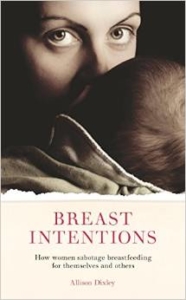 I’ve been meaning to write this for a while. I read the bulk of this book in February then returned to crazy, end-of-PhD-hell and finishing it took a bit of a back seat. I finished it not long ago but as everything is taking longer these days, this again fell to the wayside.
I’ve been meaning to write this for a while. I read the bulk of this book in February then returned to crazy, end-of-PhD-hell and finishing it took a bit of a back seat. I finished it not long ago but as everything is taking longer these days, this again fell to the wayside.
Then I was sent this link by a reader, a year old, but it screamed at me that this was the exact crap that Breast Intentions deals with so incredibly well. So here I write because you need to know about this book in order to read this type of article for what it is: One way we sabotage breastfeeding for other women.
Let me start off by saying I acknowledge that many people find the author, Allison Dixley, founder of the Alpha Parent, controversial (to say the least). She has earned the ire of formula apologists everywhere and even some breastfeeding supporters find her “too over the top”. I don’t share these concerns. Do I agree with all she says and writes? No. She knows that too and we’re okay with it. I do, however, appreciate her no-bullshit and honest approach to what she writes. You can disagree, but she’s not trying to cater to feelings or hide what she sees as the truth because someone might not like it. That’s rare in today’s blogging world because us women tend to be a little too concerned with how we’re seen instead of what we’re saying (actually a topic covered in the book too) and the book won’t do anything to change one’s mind on that element of her writing. To be honest though, I’d expect nothing less from one of Dr. Helen Ball’s graduate students (oh yes, she’s no dummy either).
What is Breast Intentions about? In short, it’s a very critical look at how us women are sabotaging breastfeeding for each other (and ourselves). The article I link to at the start is a prime example of some of the traps we set for other women. From the suggestions that milk supply problems are rampant (“What is all the more remarkable about Jodee’s story is that it isn’t that unusual.”) to the stories of the “happier” baby from the use of formula (even when not necessary) to placate any guilt (“My own daughter did not have any food for the first 24 hours or so of her life because she couldn’t latch on. After I fed her some formula, which I had to beg for, her eyes shot open and she suddenly became alert.” – note that no baby receives milk in the first 24 hours as milk takes at least that long, and up to 3 days, to come in, thus it is colostrum that baby is getting and taking 24 hours to get the hang of it is normal and if anything a dropper of formula may be the way to help ease anxiety, not a bottle), the article is just one example of how we sabotage breastfeeding by normalizing problems and normalizing formula as the fix.
People may claim that the “breast is best” motto is out in full force (a motto devised by the formula company), but why, asks Allison, if that is so, is formula still the more popular or common way to feed a baby? If there is such push from everywhere to breastfeed, why is it still failing as the societally normal way to feed a baby?
There are societal reasons – a lack of support in terms of things like maternity leave and professionals with even an iota of knowledge about breastfeeding – but Ms. Dixley ignores those in favour of speaking to women about how we are messing things up. She doesn’t discount the societal entirely (as many people believe, but there is a nod to this issue at the start of the book) but is clear that she views women as being able to overcome if they so choose and that it’s how we are sabotaging each other that means most women are not overcoming the barriers in their way. This book is about maternal empowerment, not victimization.
In my opinion, she does this brilliantly. She makes some arguments that will shock many (e.g., that switching to formula actually makes sense from a psychological perspective, due to certain evolutionary features), but they are well-grounded in science and psychology. (I did random checks on some of the over 500 citations and the ones I checked definitely supported what she was saying, but I of course did not check them all.) She also doesn’t leave the successful breastfeeder as faultless as there is an entire chapter dedicated to the contempt that many successful breastfeeders have towards the formula feeding mom and the implications of this contempt. So why would there be any question about people accepting this book?
How the book can become difficult to accept is in the way people will read it because we are inherently defensive. Because Ms. Dixley focuses much of her discussion on subconscious psychological processes, it can or will be difficult for some readers to accept what she says. No mother wants to admit that stopping breastfeeding elicited feelings of self-doubt as a mother, or even that she thought she might not be ‘a good mum’ because of it. Our brains do all they can to fight these negative emotions and thoughts, which is why it’s often out of our conscious awareness. Although others on the outside can see some of our behaviours for what they are: Defenses against the guilt and judgment we’ve put on ourselves.
As such, she’s quite clear that the main culprits in the sabotage are not those who actively choose formula (there’s no guilt there), but those who “failed” at breastfeeding and fully gave up (not mixed feeding and not those who went to the ends of the earth and truly had physical problems that prevented breastfeeding). (Yes, she uses the word “failed” and it’s another triggering word that we need to get over as a society. Failures occur daily and only by accepting and acknowledging failure can we overcome it. This is something I too have rallied against and can’t stand how sensitive we are to that word. Own it and learn from it.)
Not only does Ms. Dixley make it clear that many of our attempts to sabotage other people’s breastfeeding relationships stem from our own guilt and judgment, she also suggests we may be right to feel that guilt. This is the part that many mothers will rally against. After all, we live in a time where the idea of feeling badly about a parenting choice is seen as heresy. We’re all just doing our best, yes?
The key here is that she’s not actually judging you and saying she thinks you ought to feel guilt. The point is that if you feel it, you feel it because you had expectations for yourself that you failed to live up to. You bloody well should listen to that. As a parent, you should have ideas of what “good parenting” means to you and what you are willing to do to be the parent you want to be. If you fail at that, bringing others down so that you can feel better about your failures is a horrid cop out that sadly is becoming prevalent in our society. (Not just with breastfeeding, but other areas as well. For example, those who planned on never doing cry-it-out only to do it then preach to the masses how they “have to” or risk all sorts of perceived problems.)
Again, this is psychologically normal, but not very helpful to other women (or oneself if faced with the same situation down the line). In breastfeeding when we see friends and family push bottles early or say “you shouldn’t have to suffer” at the first sight of discomfort, they are setting the stage for failure. When friends, doctors, and “well-meaning people” try to discount the science behind breastfeeding (not to mention the biological normality of it), they are setting the stage for failure. When someone suggests you have a tin of formula available “just in case”, they are setting the stage for failure. When those who try to help women breastfeed are labelled “breastapo” or “breastfeeding Nazis” while the many other health professionals who push formula are lauded or ignored by the same individuals, they are setting the stage for failure.
But women don’t have to fail. Ms. Dixley’s book isn’t just a condemnation of the ways in which we sabotage breastfeeding, but also provides the ways we can overcome the balance that is so tilted in one direction that failure seems inevitable. The last section on how to own your breastfeeding journey is so amazing I hope it’s turned into a mini handout that can be given to women when pregnant because it really is that spot-on. Ms. Dixley also talks about the different degrees of success. Success is not always exclusive breastfeeding for six months. For some women with supply problems (but not lacking entirely), it may be mixed feeding that constitutes success, for some who cannot breastfeed, it may be the use of donor milk. Success is subjective, but we do define it ahead of time, and we have more control over it than we imagine (though, notably, not 100%).
In short, I strongly recommend this book as one that will make you think (whether or not you agree is a different issue altogether). Ignore the bad reviews (which miraculously were all written before the book came out thanks to a smear campaign put on by certain individuals in the blogging world) and judge for yourself. I just hope that whatever you think of it, you can realize that this type of discourse has been sorely lacking from the breastfeeding discussion and yet is critical to us understanding how to help mothers who want to breastfeed. And if you take away only one thing from the book, I hope it is this: Owning your own journey – success or failure – is the only way to have greater success in the long run in breastfeeding and anything else.
To purchase or read more on Breast Intentions, click here:






Very interesting; I will have to seek out a copy of this book to read. Thanks for the summary!
Allison Dixley pretty much wrote what I have thought for a very long time especially since I became pregnant about 1 1/2 years ago. When I was pregnant, I had many people (including my husband) tell me its no big deal if I use formula or if breastfeeding doesn’t work out when I expressed how much breastfeeding was important to me. I had several friends who had babies up to 6 months before me who all quit after 1 1/2 – 3 months and told me how hard and awful and painful it was. I got very similar feedback when discussing my very strong desire to have a natural birth (no epidural) as well. I got very angry when people would talk like this to me – not because I thought breastfeeding was super easy and I would have no problems or pain; I had done my research and kind of knew what to expect (who really really knows what to expect until you do it right?) – but because i knew they were laying the groundwork for my failure. After my daughter was born, i had several people make comments like “she’s eating again? didn’t you just feed her?”, “are you going to do bottles?” “What about dad? is he going to get to feed her any?” “I think she’s crying/fussing because her belly hurts because she ate too much” or “I think she’s crying/fussing because you ate that spicy food” (I eat lots of spicy food and did immediately after birth – I never saw any correlation between what I ate and her behavior/spit up patterns. Many of these comments did come from other women too; all who had either given up after a couple weeks or 2 months or those who had breastfed 30-40 years ago.
I couldn’t stand it. There were many moments where I was just furious and desperately wanted to scream at them to shut up and get away from me while I took care of my daughter. I stayed quiet though and would just simply ignore them and do what I thought was best. Needless to say, I am still nursing my 8.5 month old with no bottles even and I plan to continue until she self-weans. It definitely takes a lot of patience, self-confidence, and determination to continue though when you have such a lack of support and understanding. It did make me even more angry that most of this came from other women – that rather than helping me find answers if i did have a problem or at least just keeping their mouths shut, they felt the need to actually make it harder for me and just be negative about everything.
Knowing the experience that I had, I always try to help other women now without being judgemental if they do make the change to formula. I had a friend that was breastfeeding successfully for a couple months (while I was pregnant) but I think she lacked self-confidence (her mother in law would always make comments that her son was too skinny and he needed to fatten up) and didn’t have any role models or other women who had or were breastfeeding to ask for help or for their experience. I tried my best by offering to go with her to a breastfeeding support group (we don’t have a close by LLL but there was one offered at my hospital), to go with her or help her find a LC, I did research for her online about different “issues” she felt she had. It ended up not working because she never took me up on any of my offers or did those things on her own and I admit I felt very disappointed. but I never said anything and just offered my best support in that I know it can be hard and she had to do what she felt was best for herself and her son. Her son is a little cutie and so active and happy and I can tell she feels more at ease so that’s all that really matters in the long run. .
Great review. Nice to see there are other women out there who are not afraid of a bit of criticism – and the most constructive possible criticism at that. I was so so pleased when I read this book. I was determined to breastfeed and my husband was totally positive I’d be able to. Baby is now 8 months and so healthy, happy and strong.